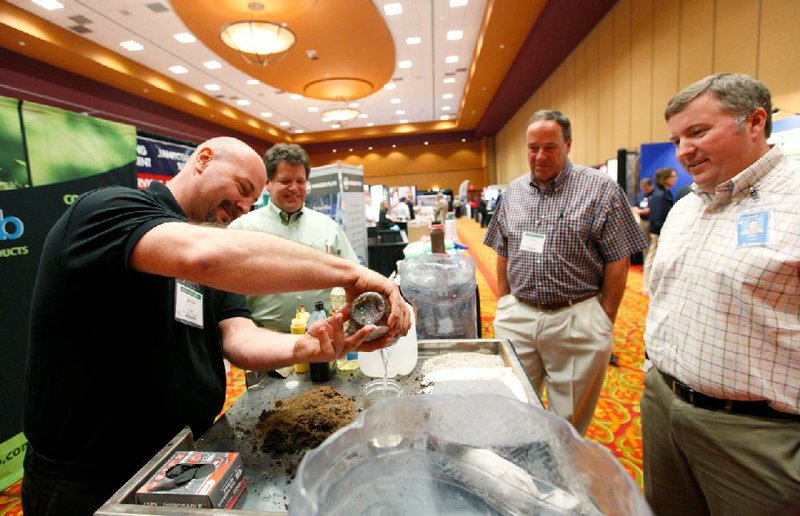ROGERS - Multinational retailer Wal-Mart Stores Inc. is again using its size and muscle on global intitiatives, one of which company officials hope will help feed the more than 9 billion people expected to inhabit the planet by 2050.
The initiatives - one that will increase the amount of farmland used for sustainable agriculture and another that will help cities enact or ramp up recycling programs - were announced Tuesday at the first day of Wal-Mart’s first-ever Sustainability Product Expo, being held at the John Q. Hammons Convention Center in Rogers.
The three-day event continues through Thursday.
The expo, attended so far by more than 2,300 people, features rows of booths manned by vendors showcasing “green” goods.
Additionally, Wal-Mart Stores Inc. President and CEO Doug McMillon on Tuesday hosted panel discussions with CEOs and other leaders from more than a dozen global companies such as Unilever, Pepsi-Co, Procter & Gamble, Kellogg Co. and Johnson & Johnson.
Participating suppliers attending the expo were said to represent more than $100 billion in sales at Wal-Mart. The company’s total revenue for fiscal 2014 was $476.3 billion.
Carter Roberts, president and CEO of the World Wildlife Fund, said companies that develop and adhere to strict sustainability practices experience an increase in sales and profits, particularly in developing countries like China and India, where the effects of climate change and resource scarcity are more prevalent.
“In our experience, those companies with brands that take these steps … their brand reputation’s improved, and you can see that trickle down directly down to the bottom line,” Roberts said.
During the panel discussions, eight of the largest food companies signed pledges they had written to Wal-Mart describing their plans for producing more sustainable products and making them available and affordable to all consumers. The efforts are expected to put 8 million acres of farmland in sustainable agriculture programs and eliminate 6 million metric tons of greenhouse gas emissions, according to a Wal-Mart release.
“Because rice is one of our largest ingredient purchases - used for Rice Krispies and Special K worldwide - it’s appropriate that our new partnership with Wal-Mart focuses on helping small-holder rice growers improve their practices and livelihoods, while also reducing greenhouse gas emissions,” said John Bryant, president and CEO of Kellogg.
Also on Tuesday, Wal-Mart and the Wal-Mart Foundation, with their partnering companies, announced plans for a recycling initiative called the Closed Loop Fund, which is intended to invest $100 million in recycling infrastructure projects and prompt others to invest private and public funds in the nation’s recycling system.
Wal-Mart shoppers, typically low- to middle-income consumers, expect low prices, but sustainability concerns also are important, according to a recent survey by Wal-Mart’s Global Customer Insights and Analytics group.
The survey found that 96 percent of Wal-Mart shoppers indicated they have purchased sustainable products in the past year.
“I think the challenge is … [consumers] do care about it, but if it costs more, if it’s inconvenient, it’s going to be very difficult for them to adopt,” said Kathleen McLaughlin, senior vice president of sustainability and president of the Wal-Mart Foundation.
“Our opportunity and our challenge is to make it easy for our customers - to help them find products that are sustainable, to offer them at prices that are not more expensive than what they can get as an alternative and make it easy for them to use those products,” she said.
Stacy Mitchell, senior researcher with the Institute for Local Self-Reliance and author of Walmart’s Assault on the Climate and Walmart’s Greenwash, issued a statement after the first day of the expo, saying “McMillon and other senior leaders once again offered shallow promises with little substance and refused to acknowledge major failures in the company’s track record on sustainability.”
Environmental experts including John Buchanan with Conservation International and the Environmental Defense Fund’s Elizabeth Sturcken objected to that statement. The fund runs a Bentonville office to keep up with Wal-Mart sustainability efforts.
“We have a long way to go to get to a truly sustainable retail business model, but no one’s moved faster or further than Wal-Mart,” Sturcken said.
“Never in the history of Wal-Mart have so many CEOs of global corporations gathered together in Bentonville before, and they were all here today because of sustainability,” she said.
Business, Pages 27 on 04/30/2014
